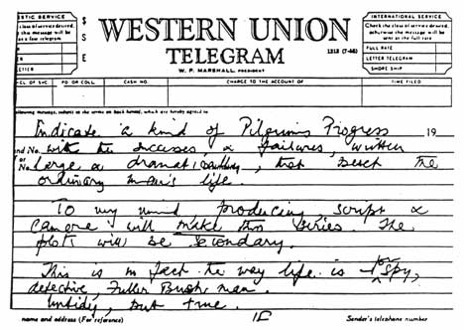



1962
Tuesday, Jan. 16, 1962
“Dr. No” starts shooting in Jamaica. Sean Connery, Ursula Andress,
Jack Lord, director Terence Young and producers Saltzman and
Broccoli spend five weeks filming island locations. Ian Fleming
visits the company when not at Goldeneye writing On Her Majesty’s
Secret Service.
Tuesday, April 10, 1962
Robert Vaughn stars in “The Boston Terrier” episode of NBC’s filmed
anthology series, The Dick Powell Show. This episode is also a pilot
created by Blake Edwards of Peter Gunn fame, with Vaughn playing
a Boston Brahmin private detective named A. Dunster Lowell.
July 1962
Ian Fleming’s agent in America, Phyllis Jackson, moves to the Ashley-Steiner Agency after MCA buys Universal Studios and is forced by federal anti-trust action to close its talent agency division.
August 1962 / circa
Jack Ball of the J. Walter Thompson advertising agency develops an interest in Ian Fleming’s upcoming book Thrilling Cities.
Saturday, Sept. 29, 1962
Second series of The Avengers, now starring Patrick Macnee as John Steed and Honor Blackman as Mrs. Catherine Gale, a widowed anthropologist who becomes a leather-clad, judo-expert amateur assistant to Steed, premieres on ITV in England at 10:05 p.m.
Sunday, Sept. 30, 1962
The Saint, starring Roger Moore as Simon Templar, roguish hero of Leslie Charteris stories since 1928, premieres on ITV at 7:25 p.m. While Templar is not a spy, his globetrotting adventures frequently involve agents from both sides of the Iron Curtain, especially in later years when the show runs out of Charteris stories to adapt.
Wednesday, Oct. 3, 1962
The Eleventh Hour, second Arena-MGM series, premieres on NBC. Sam Rolfe produces the series starring Wendell Corey and Jack Ging as psychiatrists. MGM-TV also sells Sam Benedict to NBC.
Wednesday, Oct. 3, 1962
Going My Way, starring Gene Kelly and Leo G. Carroll, premieres on ABC. Based on the 1944 movie, with Kelly as Father O’Malley (the Bing Crosby role) and Carroll as Father Fitzgibbon (the Barry Fitzgerald role). Stage and screen character actor Will Kuluva appears in the premiere episode.
Friday, Oct. 5, 1962
World premiere of “Dr. No” is held at the London Pavilion theater. James Bond’s first screen appearance draws largely favorable reviews and big box office, ensuring a second Bond film.
Friday, Oct. 19, 1962 / circa
Alden Schwimmer of Norman Felton’s agents Ashley-Steiner, aware of Felton’s interest in producing an escapist adventure series as a change of pace from Dr. Kildare and The Eleventh Hour, asks Felton to read the galleys of Fleming’s upcoming non-fiction title Thrilling Cities to determine if a TV series might be developed from the book. Jack Ball of J. Walter Thompson believes it could be a series to be sponsored by his client, Ford Motor Co.
Monday, Oct. 22, 1962 / circa
After reading Thrilling Cities, a collection of the travel stories Fleming wrote for the Sunday Times, Norman Felton attends a breakfast meeting in Jack Ball’s suite at the Beverly Hills Hotel with Ball, Schwimmer, Dan Seymour of JWT and Ashley-Steiner owner Ted Ashley. Felton rejects the possibility of developing a TV series from Thrilling Cities — but he’s inspired to ad lib an idea about a mysterious man who travels the world on sensitive secret missions. The others suggest enlisting Fleming on this project and Ashley sets out to arrange a meeting.
Wednesday, Oct. 24, 1962
“The Manchurian Candidate,” starring Frank Sinatra, Laurence Harvey, Janet Leigh and Angela Lansbury, opens. Like “North by Northwest,” “The Manchurian Candidate” anticipates and influences the coming spy craze, though few if any subsequent productions match the perfect blend of Cold War thrills and outrageously black satire on display as Army officer Sinatra uncovers a fantastic, worldwide communist plot against the United States.
Monday, Oct. 29, 1962
Ian Fleming meets Norman Felton in New York to discuss creation of a TV series involving international adventure and intrigue. In three days of discussions, Fleming contributes little of lasting use beyond the memorable name he bestows on Felton’s mystery man: Napoleon Solo.
Tuesday, Oct. 30, 1962
Dan Seymour of J. Walter Thompson hosts a dinner party for Fleming, Felton, Ashley and Ball to discuss the project, after which Felton types up further ideas to discuss with Fleming.
Wednesday, Oct. 31, 1962
Fleming reads Felton’s new pages then shows him his own notes, hand-written on Western Union telegram blanks found in his hotel room. Fleming gives Solo various character attributes and avocations, a Jesuit philosophy toward battling evil, and a secretary named April Dancer. Fleming’s notes also include a dozen one-line plot ideas, one of which — gold smuggling in Macao — is the subject of a chapter in Thrilling Cities.

Tuesday, Nov. 21, 1962
First presentation — 12 typewritten pages with a cover sheet reading “Basic Material Pertinent To… A New One Hour Television Series… SOLO. Assembled by: Ian Fleming and Norman Felton” — is sent by Jerry Leider of Ashley-Steiner to Jack Ball at J. Walter Thompson. April Dancer is now Doris Franklyn (an aspiring actress when she’s not assisting Solo or working as secretary to Solo’s unknown, unseen boss “He”), and one of Fleming’s more bizarre plotlines (trafficking in horse carcasses between Ireland and Belgian abattoirs) has been eliminated. But everything else developed by Fleming and Felton in their three days together is retained.
December 1962
JWT and MGM negotiate from Nov. 27 through mid-December over production of Solo as an NBC series for Ford. MGM executives finally decide a deal cannot be made and end discussions.
Wednesday, Dec. 12, 1962
Robert Vaughn appears in The Eleventh Hour episode, “The Blues My Baby Gave to Me.”
Wednesday, Dec. 12, 1962
John Huston’s “Freud” — with David McCallum in an attention-grabbing role as a disturbed patient of the young Dr. Sigmund Freud, played by Montgomery Clift — opens in the United States. Film also features a notable score by Jerry Goldsmith.

